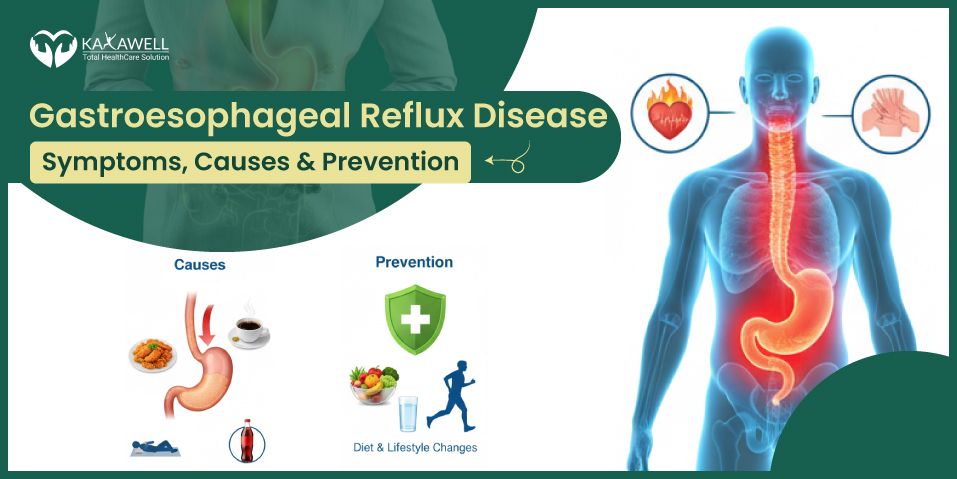Gastroesophageal reflux disease (GERD) occurs when acid from the stomach sometimes flows back into the channel that connects the mouth and stomach. This backwash (acid reflux) will irritate your esophageal lining.
Many people sometimes experience acid reflux. GERD is mild acid reflux occurring at least twice a week, or a moderate to extreme reflux of acid occurring at least once a week.
Most people can control GERD’s discomfort by improvements in lifestyle and over-the-counter medicines. But some people with GERD can need to take stronger medications or surgery to relieve symptoms.
Symptoms
Common signs and symptoms of GERD include:
- Burning in your chest, usually after eating, which could be worse at night Chest pain
- Difficulty swallowing
- Regurgitation of food or sour liquid
- Sensation of a lump in your throat
If you have reflux nighttime acid, you might also experience:
- Chronic cough
- Laryngitis
- New or worsening asthma
- Disrupted sleep
When to see a doctor
If you suffer from chest pain, particularly if you also have shortness of breath, or jaw or arm pain, seek urgent medical treatment. Signs and signs of a heart attack maybe these.
Make an appointment with your doctor if you:
- Experience severe or frequent GERD symptoms
- Take over-the-counter heartburn medicines more than two days a week
Causes
GERD is caused by frequent acid reflux.
A circular band of muscle around the bottom of your esophagus (lower esophageal sphincter) relaxes to allowing food and liquid to flow through your stomach when you swallow.
The stomach acid may flow back into your esophagus if the sphincter relaxes abnormally or weakens. The persistent acid backwash irritates the esophagus lining and also causes it to become inflamed.
Risk factors
Conditions that may increase the GERD risk include:
- Obesity
- Into the diaphragm (hiatal hernia) bulging of the top of the stomach up
- Pregnancy
- Connective tissue disorders, such as scleroderma
- Delayed stomach emptying
Factors that can aggravate acid reflux include:
- Smoking
- Consuming big meals or consuming late at night
- Eating some foods (triggers) like fat or fried foods
- Drinking some beverages, like alcohol or coffee
- Taking certain medications, such as aspirin
Complications
Over time, the esophagus can have chronic inflammation:
Narrowing of the esophagus: Damage to the lower esophagus caused by stomach acid cause scar tissue to form. The scar tissue narrows the food pathway which leads to swallowing problems.
An open sore in the esophagus: Stomach acid in the esophagus may strip away tissue, causing the development of an open sore. An esophageal ulcer can bleed, cause pain and cause difficulty swallowing.
Home remedies for GERD
There are some improvements in lifestyle and home remedies that may help alleviate the symptoms of GERD.
For example, it might help to:
- Quit smoking
- Lose excess weight
- Eat smaller meals
- Chew gum after eating
- Avoid lying down after eating
- Avoid foods and beverages that cause your symptoms
- Avoid wearing tight clothing
- Practice relaxation techniques
Some herbal remedies might also provide relief.
Herbs commonly used for GERD include:
- Chamomile
- Licorice Root
- Marshmallow Root
- Slippery Elm
Though more research is required, some people report acid reflux relief after taking supplements, tinctures or teas containing certain herbs.
Prevention
Below are 10 tips which you should use to stop GERD.
1. Lose weight. Obesity is the leading cause of GERD. Extra fat in the stomach brings pressure on your belly and forces up gastric juices into your esophagus. Lose weight if you’re overweight, and don’t gain weight if you’re not.
2. Avoid foods known to cause reflux. If you’re at risk for GERD, avoid:
- Fatty foods
- Spicy foods
- Acidic foods, like tomatoes and citrus
- Mint
- Chocolate
- Onions
- Coffee or any caffeinated beverage
- Carbonated beverages
3. Eat smaller meals: Big meals fill the stomach and place pressure on the LES, making it more likely to cause reflux and GERD.
4. Don’t lie down after eating: Wait a minimum of three hours before lying down after a meal. Gravity usually helps avoid the production of acid reflux. You take gravity out of the equation when you eat a meal and then stretch out for a nap. As a consequence, acid pushes against the LES more quickly and flows into the esophagus.
5. Review your medications. There are a variety of drugs that can increase the risk of GERD, either by calming the LES, interfering with the digestive process or by further irritating an already inflamed esophagus. These medications include:
- Non-steroidal anti-inflammatory drugs, or NSAIDs
- Calcium channel blockers
- Certain asthma medications, including beta-agonists like albuterol
- Anticholinergic, medications used to treat conditions such as seasonal allergies and glaucoma
- Bisphosphonates, used to boost bone density
- Sedatives and painkillers
- Some antibiotics
- Potassium
- Iron tablets
When you are taking any of these drugs, speak to your doctor about moving to another medicine that does not affect the upper digestive tract the same way. Never stop taking a prescription drug without consulting your doctor first though.
7. Quit smoking: Some studies have found that nicotine can relax the LES muscles, and may also interfere with the ability of the saliva to clear acid from the esophagus.
8. Cut back on alcohol: With smoking, the LES can relax by alcohol. Alcohol can also induce spasming of the esophageal muscles.
9. Wear loose-fitting clothes: Do not wear tight clothes or belts which can limit your stomach.
10. Try a gluten-free diet: At least one study found that GERD symptoms can be caused or worsened, with a protein found in grains such as barley, rye and wheat. Try removing gluten from your diet and see if it does make a difference.

Leave a Reply
You must be logged in to post a comment.